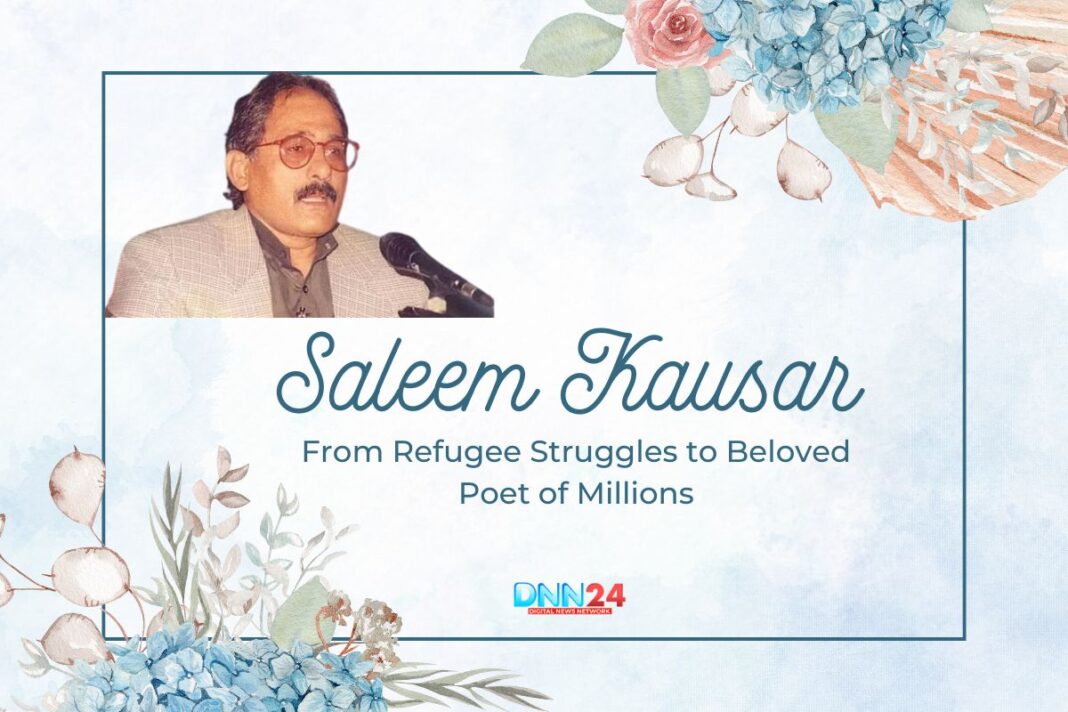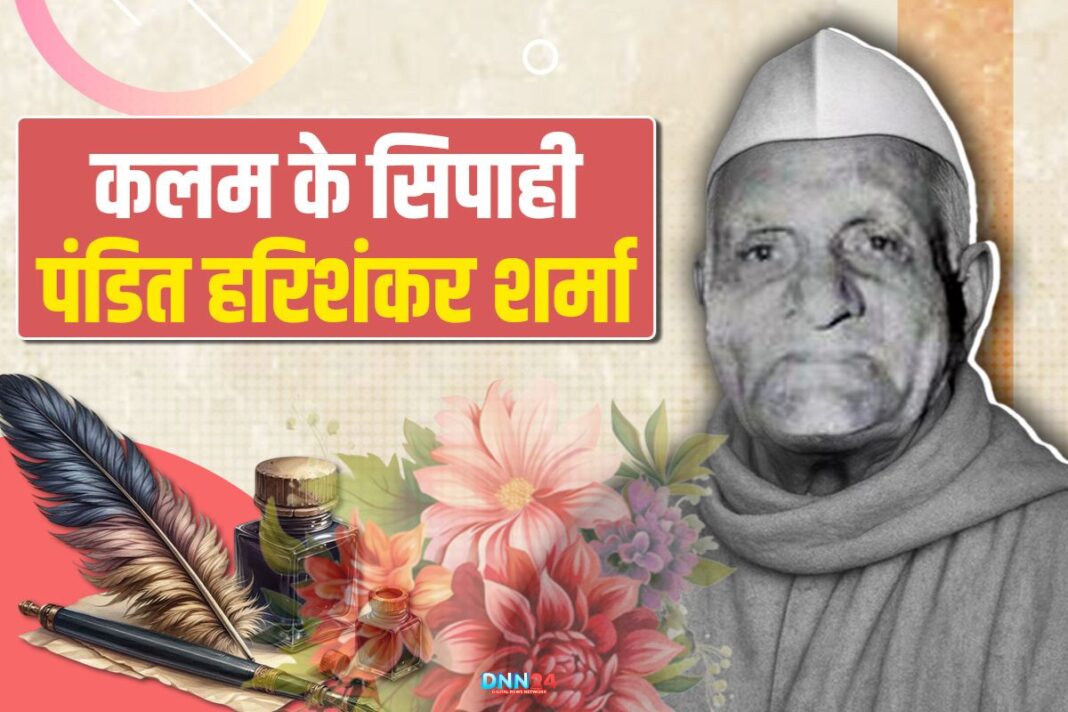Muhammad Saleem Kausar entered this world on 24 October 1947, when India split into two nations. His birthplace was Panipat, but like thousands of other families, his parents had to leave everything behind and cross the border to Pakistan. They finally settled in Khanewal, Punjab, where little Saleem grew up hearing stories of the homeland they had lost.
qurbaten hote hue bhi faslon mein qaid hain
Saleem Kausar
kitni aazadi se hum apni hadon mein qaid hain
The boy who would later become famous as Saleem Kausar spent his childhood listening to elders talk about their old villages, friends they would never see again, and dreams that Partition had broken.
kahani likhte hue dastan sunate hue
Saleem Kausar
wo so gaya hai mujhe khwab se jagate hue
Even as a young boy, Saleem had a special gift with words. Neighbours would come to him when they needed letters written or wanted someone to put their feelings into verses. He would sit under the night sky, looking at the moon and stars, and somehow beautiful lines would form in his mind. His family later moved to Kabeerwala, where he met established poets who encouraged his talent.
aur is se pehle ki sabit ho jurm-e-khamoshi
Saleem Kausar
hum apni raaye ka izhar karna chahte hain
He started attending mushairas, those poetry gatherings where people shared their hearts through verses. But when things were going well, all his poet friends moved to Radio Multan, leaving Saleem alone. This loneliness became the first real pain that shaped his poetry, teaching him what it meant to be left behind.
main khayal hoon kisi aur ka mujhe sochta koi aur hai
Saleem Kausar
sar-e-aaina mera aks hai pas-e-aaina koi aur hai
The Big City Dream with Empty Pockets
When opportunities dried up in Kabeerwala, young Saleem made a brave decision that would change his life forever. With only 20 rupees in his pocket, he travelled all the way to Karachi, hoping the big city would give him the chance he needed. Karachi in those days was not easy for newcomers, especially for someone with dreams of becoming a poet.
hum ne to khud se intiqam liya
Saleem Kausar
tum ne kya soch kar mohabbat ki
Saleem lived in a small two-storey house in a neighbourhood that many people called dangerous. The area had so much trouble that some folks were scared even to visit, but Saleem discovered something beautiful there – neighbours who became his family.
aaina khud bhi sanwarta tha hamari khaatir
Saleem Kausar
hum tere waaste tayyar hua karte the
Life in the city of lights started from the very bottom. Saleem took whatever work he could find at Urdu newspapers – copying articles, doing calligraphy, checking for mistakes – anything that would put food on the table. The pay was small, and some days were more challenging than others, but he never stopped writing poetry.
tujhe dushmanon ki khabar na thi mujhe doston ka pata nahin
Saleem Kausar
teri daastan koi aur thi mera waaqia koi aur hai
Every day, he would fill the empty spaces in newspapers with his verses, hoping someone would read them and feel less alone. There is a lovely story from those struggling days – when people asked Saleem what he did for work, he would say, “I write poetry.” When they pushed him to tell them his “real job,” he would repeat with a gentle smile, “I write poetry.” This became his way of saying that poetry was not just his work, but his life.
kabhi ishq karo aur phir dekho is aag mein jalte rehne se
Saleem Kausar
kabhi dil par aanch nahin aati kabhi rang kharab nahin hota
When Words Touched Million Hearts
His ability to speak directly to people’s hearts made Saleem Kausar different from other poets. His breakthrough came with the ghazal “Main khayal hoon kisi aur ka” – a line that perfectly captured how it feels to love someone who thinks of someone else.
mujhe sambhalne mein itni ehtiyaat na kar
Saleem Kausar
bikhar na jaun kahin main teri hifazat mein
This poem became so popular that singers across the country wanted to perform it, and even today, people remember these words when they think about unrequited love. The success of this ghazal proved that Saleem had an exceptional understanding of human emotions.
main kisi ke dast-e-talab mein hoon to kisi ke harf-e-dua mein hoon
Saleem Kausar
main naseeb hoon kisi aur ka mujhe maangta koi aur hai
His poetry was not limited to love stories. He wrote about separation, waiting for better days, dreams that seemed impossible, and the everyday courage that ordinary people show. Even though Karachi around him sometimes witnessed violence and unrest, Saleem refused to let bitterness enter his verses. Instead, he saw all human suffering as part of a larger story that deserved compassion, not anger.
waqt ruk ruk ke jinhein dekhta rehta hai ‘Saleem’
Saleem Kausar
ye kabhi waqt ki raftaar hua karte the
His approach was simple – he believed that poetry could heal both the writer and the reader. During his most difficult financial times, when he barely had enough money to survive, Saleem continued writing because he felt that sharing hope through words was more important than earning money. He often said his heart was like a treasure that became richer the more he shared it with others.
pukarte hain unhein sahilon ke sannate
jo log doob gaye kashtiyan banate hue
A Simple Life with Grand Impact
As Saleem Kausar became more famous, he chose to live the same simple life he had always known. His days were spent writing new poems, attending poetry gatherings, and creating beautiful calligraphy, especially writing the Prophet’s name in different artistic styles. He saw himself as someone whose job was to keep hope alive in people’s hearts.
duniya achchi bhi nahin lagti hum aison ko ‘Saleem’
Saleem Kausar
aur duniya se kinaara bhi nahin ho sakta
Saleem believed that poets had a special responsibility to speak for those who had no voice and to stand against injustice wherever they found it. Even when people called poets dreamers, as if dreaming was something to be ashamed of, Saleem wore that label with pride.
jo meri riyaazat-e-neem-shab ko ‘Saleem’ subah na mil saki
Saleem Kausar
to phir is ke maani to ye hue ki yahan Khuda koi aur hai
His greatest happiness came from his family’s success. All seven of his children earned master’s degrees, one becoming a university teacher and another a doctor. But even with all these achievements, Saleem’s biggest dream remained unchanged – he wanted his poetry to help lift people “out of the darkness of ignorance” and make them shine like “stars, moon, and sun.” In 2015, he received Pakistan’s “Pride of Performance” award, but he always said his real reward was the love his readers gave him.
raat ko raat hi is baar kaha hai hum ne
Saleem Kausar
hum ne is baar bhi tauheen-e-adalat nahin ki
His famous poems like “Muhabbat aik shajar hai,” “Yeh chiragh hai tau jala rahe,” and “Zara mausam badalnay dau” continue to comfort people across generations. His life story teaches us that the most beautiful poetry often comes not from comfort but from the determination to keep believing in love and hope, even when life seems determined to break that belief.
Also Read: Rajinder Manchanda Bani: The Voice of Pain, Hope, and Endurance
You can connect with DNN24 on Facebook, Twitter, and Instagram and subscribe to our YouTube channel.



